Module 2 Experiences 单元话题完形填空 【含答案+解析】 -2024-2025学年八年级英语下册单元重难点高频易错题专练(外研版2024)
文档属性
| 名称 | Module 2 Experiences 单元话题完形填空 【含答案+解析】 -2024-2025学年八年级英语下册单元重难点高频易错题专练(外研版2024) | 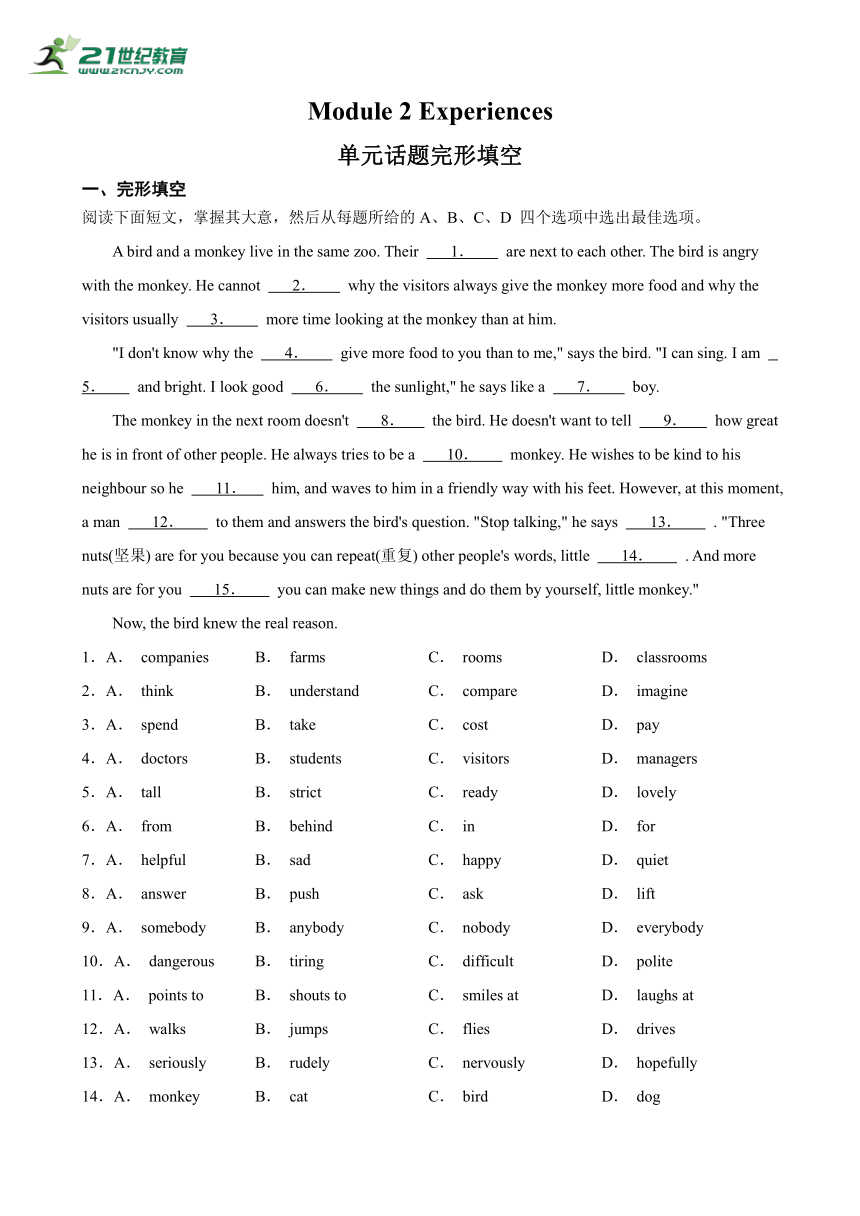 | |
| 格式 | docx | ||
| 文件大小 | 52.1KB | ||
| 资源类型 | 试卷 | ||
| 版本资源 | 外研版 | ||
| 科目 | 英语 | ||
| 更新时间 | 2025-02-16 14:30:03 | ||
图片预览

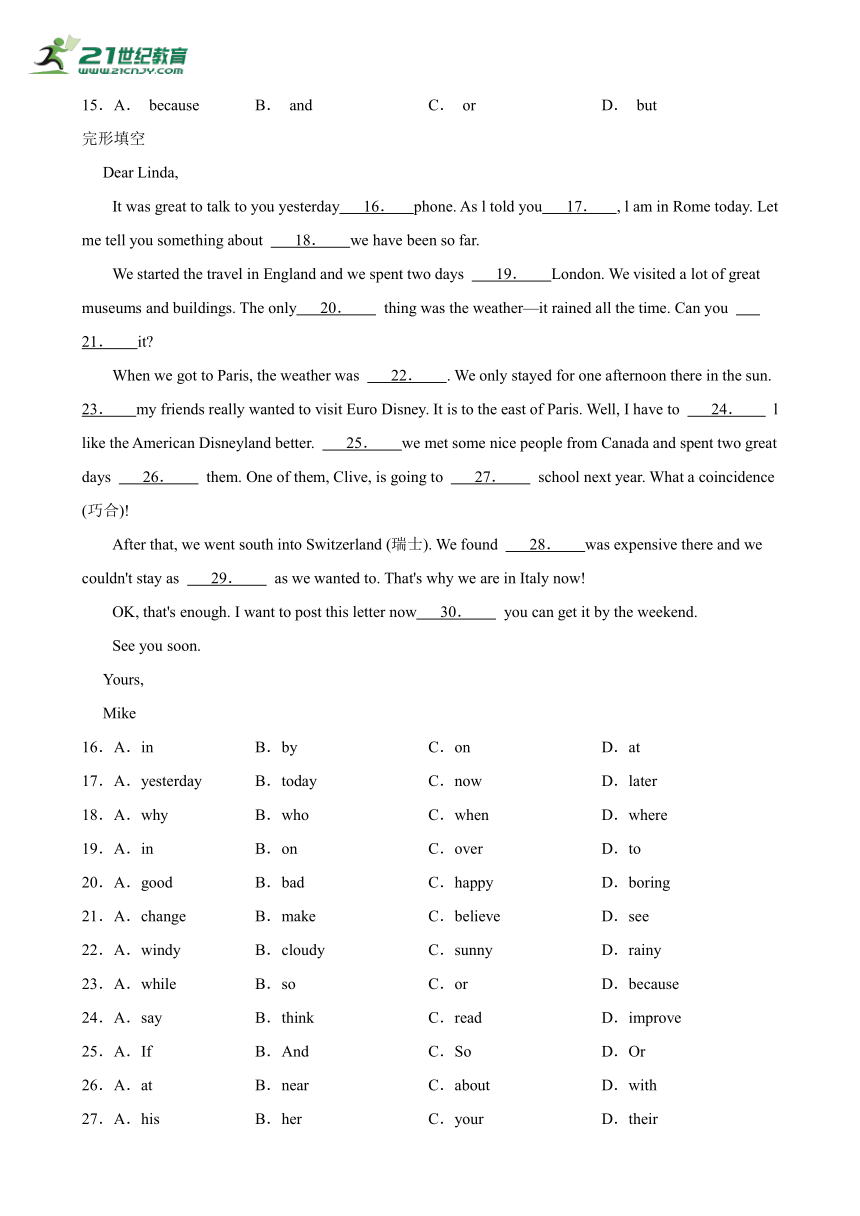
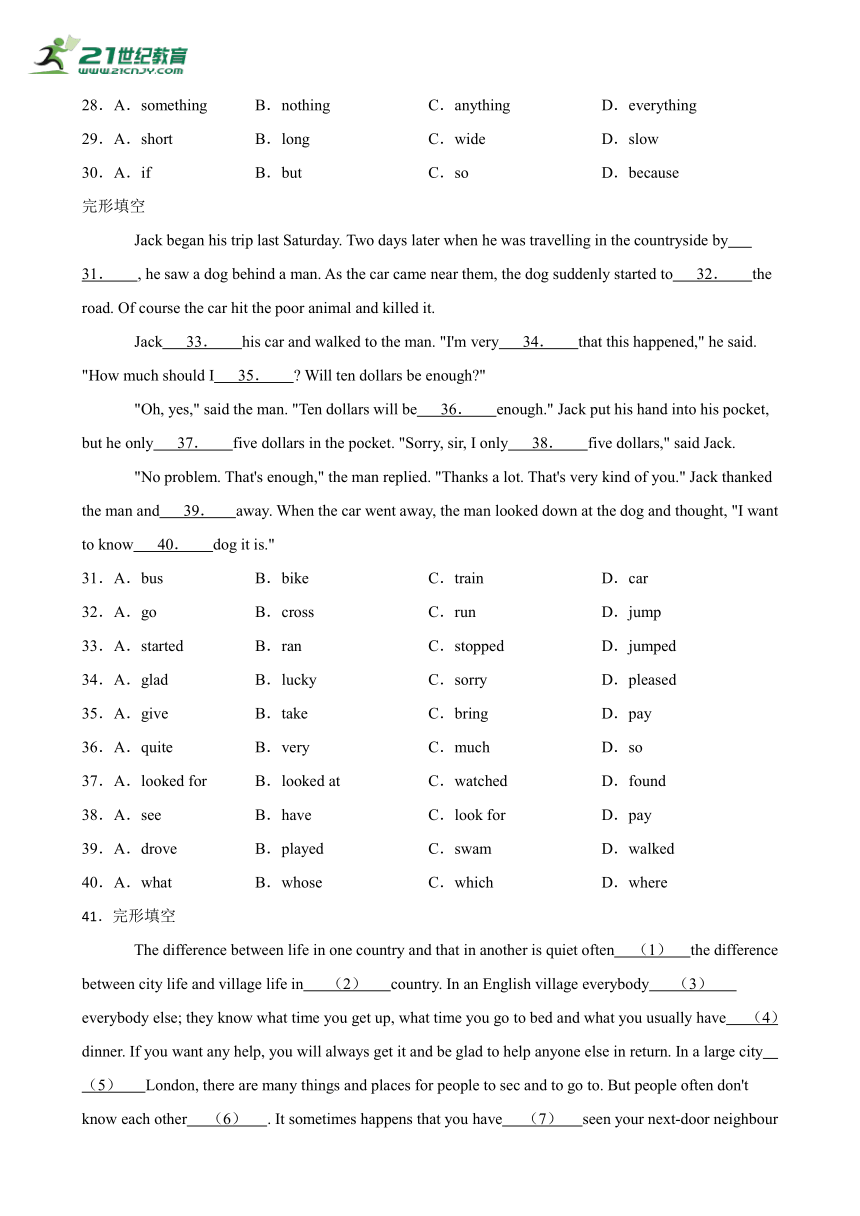
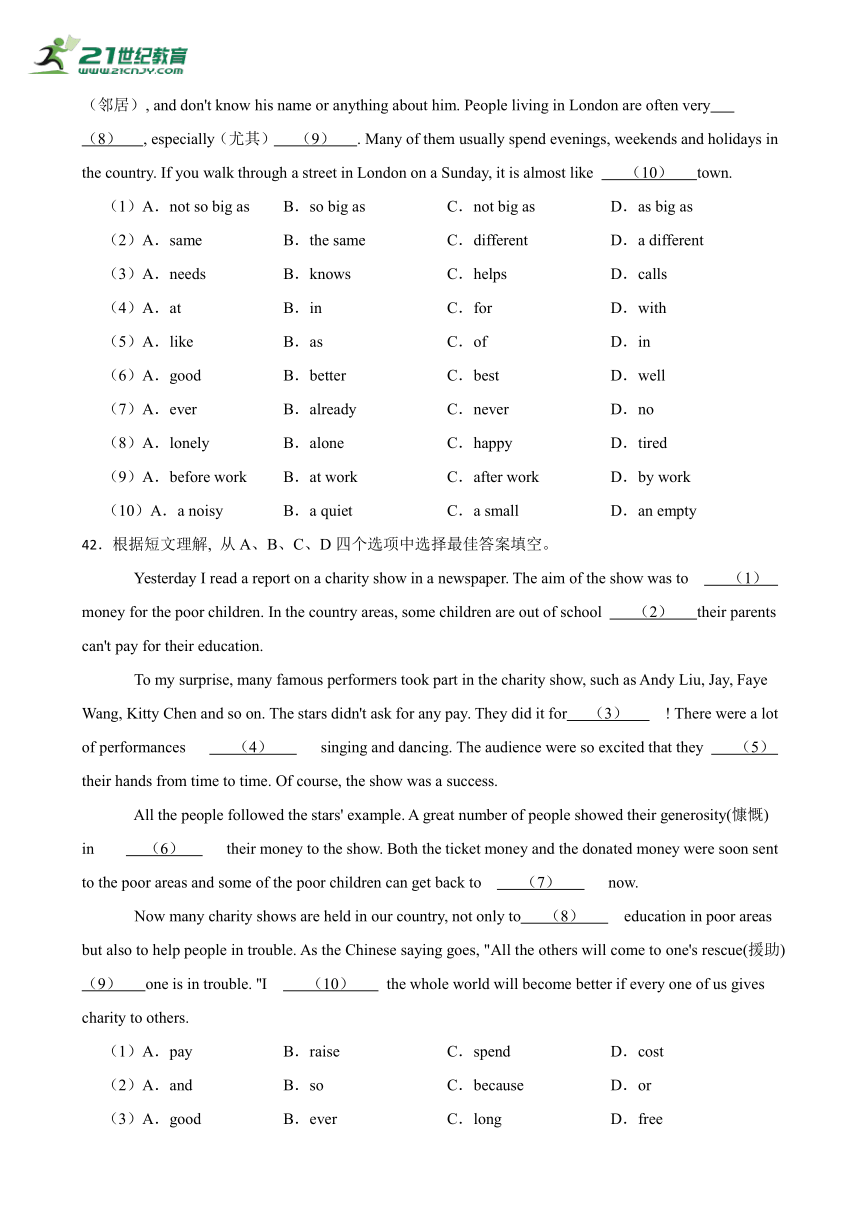
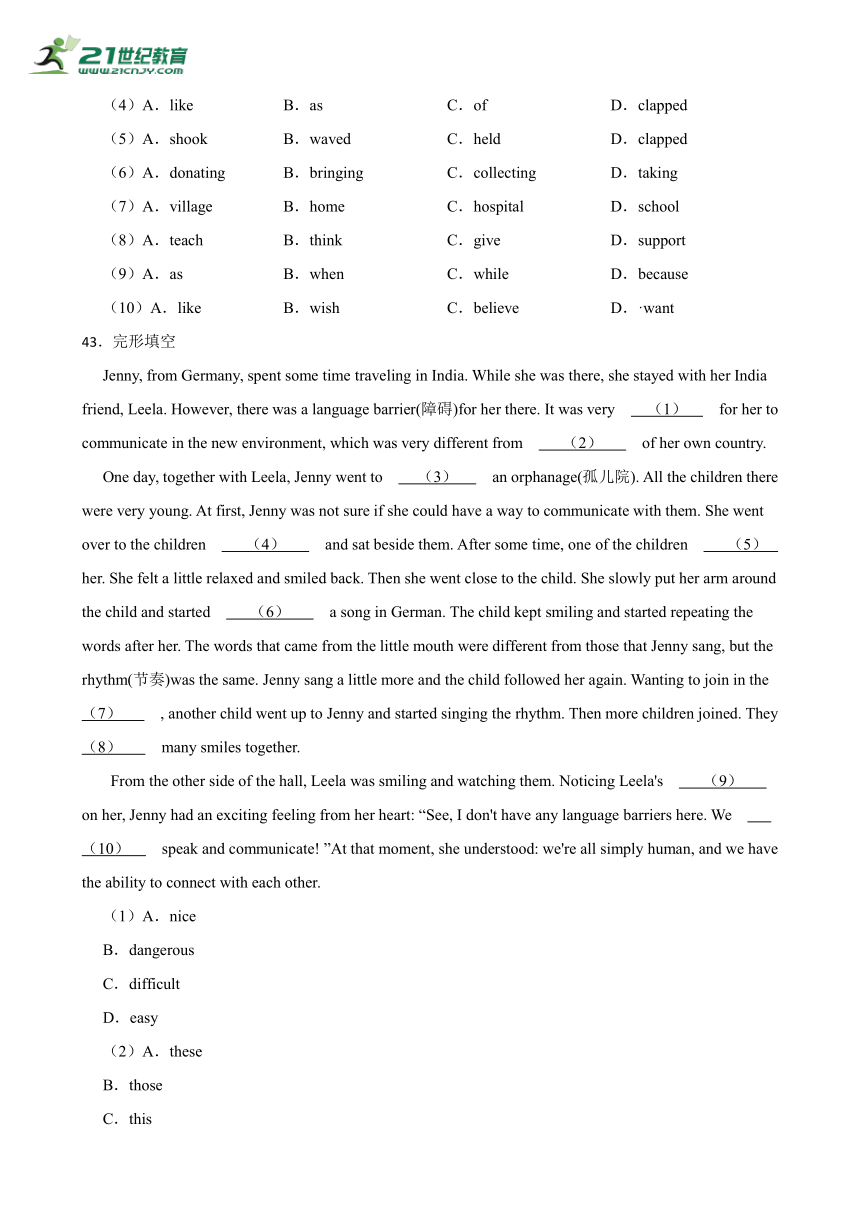
文档简介
Module 2 Experiences
单元话题完形填空
一、完形填空
阅读下面短文,掌握其大意,然后从每题所给的A、B、C、D 四个选项中选出最佳选项。
A bird and a monkey live in the same zoo. Their 1. are next to each other. The bird is angry with the monkey. He cannot 2. why the visitors always give the monkey more food and why the visitors usually 3. more time looking at the monkey than at him.
"I don't know why the 4. give more food to you than to me," says the bird. "I can sing. I am 5. and bright. I look good 6. the sunlight," he says like a 7. boy.
The monkey in the next room doesn't 8. the bird. He doesn't want to tell 9. how great he is in front of other people. He always tries to be a 10. monkey. He wishes to be kind to his neighbour so he 11. him, and waves to him in a friendly way with his feet. However, at this moment, a man 12. to them and answers the bird's question. "Stop talking," he says 13. . "Three nuts(坚果) are for you because you can repeat(重复) other people's words, little 14. . And more nuts are for you 15. you can make new things and do them by yourself, little monkey."
Now, the bird knew the real reason.
1.A. companies B. farms C. rooms D. classrooms
2.A. think B. understand C. compare D. imagine
3.A. spend B. take C. cost D. pay
4.A. doctors B. students C. visitors D. managers
5.A. tall B. strict C. ready D. lovely
6.A. from B. behind C. in D. for
7.A. helpful B. sad C. happy D. quiet
8.A. answer B. push C. ask D. lift
9.A. somebody B. anybody C. nobody D. everybody
10.A. dangerous B. tiring C. difficult D. polite
11.A. points to B. shouts to C. smiles at D. laughs at
12.A. walks B. jumps C. flies D. drives
13.A. seriously B. rudely C. nervously D. hopefully
14.A. monkey B. cat C. bird D. dog
15.A. because B. and C. or D. but
完形填空
Dear Linda,
It was great to talk to you yesterday 16. phone. As l told you 17. , l am in Rome today. Let me tell you something about 18. we have been so far.
We started the travel in England and we spent two days 19. London. We visited a lot of great museums and buildings. The only 20. thing was the weather—it rained all the time. Can you 21. it
When we got to Paris, the weather was 22. . We only stayed for one afternoon there in the sun. 23. my friends really wanted to visit Euro Disney. It is to the east of Paris. Well, I have to 24. l like the American Disneyland better. 25. we met some nice people from Canada and spent two great days 26. them. One of them, Clive, is going to 27. school next year. What a coincidence (巧合)!
After that, we went south into Switzerland (瑞士). We found 28. was expensive there and we couldn't stay as 29. as we wanted to. That's why we are in Italy now!
OK, that's enough. I want to post this letter now 30. you can get it by the weekend.
See you soon.
Yours,
Mike
16.A.in B.by C.on D.at
17.A.yesterday B.today C.now D.later
18.A.why B.who C.when D.where
19.A.in B.on C.over D.to
20.A.good B.bad C.happy D.boring
21.A.change B.make C.believe D.see
22.A.windy B.cloudy C.sunny D.rainy
23.A.while B.so C.or D.because
24.A.say B.think C.read D.improve
25.A.If B.And C.So D.Or
26.A.at B.near C.about D.with
27.A.his B.her C.your D.their
28.A.something B.nothing C.anything D.everything
29.A.short B.long C.wide D.slow
30.A.if B.but C.so D.because
完形填空
Jack began his trip last Saturday. Two days later when he was travelling in the countryside by 31. , he saw a dog behind a man. As the car came near them, the dog suddenly started to 32. the road. Of course the car hit the poor animal and killed it.
Jack 33. his car and walked to the man. "I'm very 34. that this happened," he said. "How much should I 35. Will ten dollars be enough "
"Oh, yes," said the man. "Ten dollars will be 36. enough." Jack put his hand into his pocket, but he only 37. five dollars in the pocket. "Sorry, sir, I only 38. five dollars," said Jack.
"No problem. That's enough," the man replied. "Thanks a lot. That's very kind of you." Jack thanked the man and 39. away. When the car went away, the man looked down at the dog and thought, "I want to know 40. dog it is."
31.A.bus B.bike C.train D.car
32.A.go B.cross C.run D.jump
33.A.started B.ran C.stopped D.jumped
34.A.glad B.lucky C.sorry D.pleased
35.A.give B.take C.bring D.pay
36.A.quite B.very C.much D.so
37.A.looked for B.looked at C.watched D.found
38.A.see B.have C.look for D.pay
39.A.drove B.played C.swam D.walked
40.A.what B.whose C.which D.where
41.完形填空
The difference between life in one country and that in another is quiet often (1) the difference between city life and village life in (2) country. In an English village everybody (3) everybody else; they know what time you get up, what time you go to bed and what you usually have (4) dinner. If you want any help, you will always get it and be glad to help anyone else in return. In a large city (5) London, there are many things and places for people to sec and to go to. But people often don't know each other (6) . It sometimes happens that you have (7) seen your next-door neighbour(邻居), and don't know his name or anything about him. People living in London are often very (8) , especially(尤其) (9) . Many of them usually spend evenings, weekends and holidays in the country. If you walk through a street in London on a Sunday, it is almost like (10) town.
(1)A.not so big as B.so big as C.not big as D.as big as
(2)A.same B.the same C.different D.a different
(3)A.needs B.knows C.helps D.calls
(4)A.at B.in C.for D.with
(5)A.like B.as C.of D.in
(6)A.good B.better C.best D.well
(7)A.ever B.already C.never D.no
(8)A.lonely B.alone C.happy D.tired
(9)A.before work B.at work C.after work D.by work
(10)A.a noisy B.a quiet C.a small D.an empty
42.根据短文理解, 从A、B、C、D四个选项中选择最佳答案填空。
Yesterday I read a report on a charity show in a newspaper. The aim of the show was to (1) money for the poor children. In the country areas, some children are out of school (2) their parents can't pay for their education.
To my surprise, many famous performers took part in the charity show, such as Andy Liu, Jay, Faye Wang, Kitty Chen and so on. The stars didn't ask for any pay. They did it for (3) ! There were a lot of performances (4) singing and dancing. The audience were so excited that they (5) their hands from time to time. Of course, the show was a success.
All the people followed the stars' example. A great number of people showed their generosity(慷慨) in (6) their money to the show. Both the ticket money and the donated money were soon sent to the poor areas and some of the poor children can get back to (7) now.
Now many charity shows are held in our country, not only to (8) education in poor areas but also to help people in trouble. As the Chinese saying goes, "All the others will come to one's rescue(援助) (9) one is in trouble. ''I (10) the whole world will become better if every one of us gives charity to others.
(1)A.pay B.raise C.spend D.cost
(2)A.and B.so C.because D.or
(3)A.good B.ever C.long D.free
(4)A.like B.as C.of D.clapped
(5)A.shook B.waved C.held D.clapped
(6)A.donating B.bringing C.collecting D.taking
(7)A.village B.home C.hospital D.school
(8)A.teach B.think C.give D.support
(9)A.as B.when C.while D.because
(10)A.like B.wish C.believe D.·want
43.完形填空
Jenny, from Germany, spent some time traveling in India. While she was there, she stayed with her India friend, Leela. However, there was a language barrier(障碍)for her there. It was very (1) for her to communicate in the new environment, which was very different from (2) of her own country.
One day, together with Leela, Jenny went to (3) an orphanage(孤儿院). All the children there were very young. At first, Jenny was not sure if she could have a way to communicate with them. She went over to the children (4) and sat beside them. After some time, one of the children (5) her. She felt a little relaxed and smiled back. Then she went close to the child. She slowly put her arm around the child and started (6) a song in German. The child kept smiling and started repeating the words after her. The words that came from the little mouth were different from those that Jenny sang, but the rhythm(节奏)was the same. Jenny sang a little more and the child followed her again. Wanting to join in the (7) , another child went up to Jenny and started singing the rhythm. Then more children joined. They (8) many smiles together.
From the other side of the hall, Leela was smiling and watching them. Noticing Leela's (9) on her, Jenny had an exciting feeling from her heart: “See, I don't have any language barriers here. We (10) speak and communicate! ”At that moment, she understood: we're all simply human, and we have the ability to connect with each other.
(1)A.nice
B.dangerous
C.difficult
D.easy
(2)A.these
B.those
C.this
D.that
(3)A.show
B.visit
C.build
D.improve
(4)A.slowly
B.early
C.hardly
D.easily
(5)A.looked at
B.laughed at
C.shouted at
D.smiled at
(6)A.singing
B.writing
C.saying
D.playing
(7)A.club
B.talk
C.fun
D.dance
(8)A.forgot
B.remembered
C.shared
D.missed
(9)A.hands
B.eyes
C.influence
D.questions
(10)A.can
B.must
C.need
D.should
答案解析部分
1.C;2.B;3.A;4.C;5.D;6.C;7.B;8.A;9.B;10.D;11.C;12.A;13.A;14.C;15.A
大意:本文讲述了一个动物园里的鸟和猴子之间的小故事。考查完形填空。第一遍首先快速阅读文章,把握文章大意;其次重点查看空格句,联系上下文,理解句意,选出正确答案;最后带着答案阅读一遍文章进行复查。
1.他们的房间相邻。A:companies - 公司;B:farms - 农场;C:rooms - 房间;D:classrooms - 教室。根据上文 A bird and a monkey live in the same zoo. 一只鸟和一只猴子住在同一个动物园,可知应是房间相邻。故选C。
2.他不明白为什么游客总是给猴子更多的食物,为什么游客通常看猴子的时间比看他的时间还多。A:think - 想,认为;B:understand - 理解;C:compare - 比较;D:imagine - 想象。根据 why the visitors usually 3 more time looking at the monkey than at him 为什么游客通常看猴子的时间比看他的时间还多,可知是不理解。故选B。
3.他不明白为什么游客总是给猴子更多的食物,为什么游客通常看猴子的时间比看他的时间还多。A:spend - 花费(主语为人,宾语为时间、金钱);B:take - 花费(主语为it,宾语为时间),拿;C:cost - 花费(主语为物,宾语为金钱),成本;D:pay - 支付(主语为人,后接介词for)。根据 the visitors usually 3 more time ,可知是指游客花时间,应用动词spend。故选A。
4.我不知道为什么游客给你的食物比给我的多。A:doctors - 医生;B:students - 学生;C:visitors - 游客;D:managers - 经理。根据上文 He cannot 2 why the visitors always give the monkey more food 他不明白为什么游客总是给猴子更多的食物,可知是游客。故选C。
5.我可爱而乖巧。A:tall - 高的;B:strict - 严格的;C:ready - 准备好的;D:lovely - 可爱的。根据上文 says the bird. 小鸟说,以及并列形容词bright"乖巧的",可知是觉得自己可爱。故选D。
6.我在阳光下很美。A:from - 来自;B:behind - 在...后面;C:in - 在...里面;D:for - 为了。根据 I look good ,可知应是在阳光下很美,应用介词in。故选C。
7.他说得像个悲伤的男孩。A:helpful - 有帮助的;B:sad - 悲伤的;C:happy - 快乐的;D:quiet - 安静的。根据前文 He cannot 2 why the visitors always give the monkey more food and why the visitors usually 3 more time looking at the monkey than at him. 他不明白为什么游客总是给猴子更多的食物,为什么游客通常看猴子的时间比看他的时间还多,可知此处应是伤心的。故选B。
8.隔壁房间的猴子没有回答小鸟。A:answer - 回答;B:push - 推;C:ask - 问;D:lift - 提起。根据上文 I don't know why the 4 give more food to you than to me 我不知道为什么游客给你的食物比给我的多,可知此处应是没有回答。故选A。
9.他不想在别人面前说自己有多棒。A:somebody - 某人(用于肯定句);B:anybody - 任何人(用于否定句/疑问句);C:nobody - 没有人(用于肯定句表否定);D:everybody - 每个人。 He doesn't want to tell ,可知应是不想告诉任何人。应用不定代词anybody。故选B。
10.他总是试图做一只有礼貌的猴子。A:dangerous - 危险的;B:tiring - 累人的;C:difficult - 困难的;D:polite - 有礼貌的。根据下文He wishes to be kind to his neighbour so he 11 him, and waves to him in a friendly way with his feet. 他希望与邻居友好相处,所以他向邻居微笑,并用脚友好地向邻居挥手,可知是试图做一只有礼貌的猴子。故选D。
11.他希望与邻居友好相处,所以他向邻居微笑,并用脚友好地向邻居挥手。A:points to - 指向;B:shouts to - 对...大喊;C:smiles at - 对...微笑;D:laughs at - 嘲笑。根据 He wishes to be kind to his neighbour 他希望与邻居友好相处,可知所以他向邻居微笑。故选C。
12.然而,就在这个时候,一个人走了过来,回答了小鸟的问题。A:walks - 走;B:jumps - 跳跃;C:flies - 飞;D:drives - 驾驶。根据主语the man,可知应是走过来的。故选A。
13."别说了,"他粗鲁地说。A:seriously - 严肃地;B:rudely - 粗鲁地;C:nervously - 紧张地;D:hopefully - 充满希望地。根据"Stop talking,""别说了,",可知应是粗鲁的。故选B。
14.三个坚果是给你的,因为你会重复别人的话,小鸟。A:monkey - 猴子;B:cat - 猫;C:bird - 鸟;D:dog - 狗。根据 because you can repeat(重复) other people's words 因为你会重复别人的话,可知是小鸟。故选C。
15.更多的坚果是给你的,因为你可以自己创造新事物,小猴子。A:because - 因为;B:and - 和;C:or - 或者;D:but - 但是。根据 And more nuts are for you更多的坚果是给你的,可知是因为你可以自己创造新事物。故选A。
16.B;17.A;18.D;19.A;20.B;21.C;22.C;23.D;24.A;25.B;26.D;27.C;28.D;29.B;30.C
文章大意:短文讲述了迈克给Linda写了一封信,说明自己在旅途中的美丽景色和文化,并给Linda买了礼物。
考查完形填空,首先通读一遍文章,跳过缺失的单词,再根据上下文来判断所缺单词的含义,最后对选项进行区别,选出正确的那一项。
16.昨天能和你通电话真是太好了。A.in在......里面;B.by通过;C.on在......上面;D.at在(时刻/小地点)。根据后文的“phone电话,手机”可知是通过电话进行沟通,故选B。
17.就像我昨天告诉你的,我现在在罗马。A.yesterday昨天;B.today今天;C.now现在;D.later之后。结合语境“l am in Rome today”故前面是说昨天告诉她的,故选A。
18.让我告诉你一些我们到目前为止的情况。A.why为什么;B.who谁;C.when什么时候;D.where哪里。结合句意可知是指旅游的地点,选择where引导的宾语从句,故选D。
19.我们在英国开始旅行,在伦敦呆了两天。A.in在......;B.on在......上面;C.over在......上面;D.to到达。此处意指“spent two days in London在伦敦呆了两天”,故选A。
20.唯一不好的事情就是天气——一直在下雨。A.good好的;B.bad不好的;C.happy开心的;D.boring无趣的。根据后文语境“it rained all the time”可知是不好的,故选B。
21.你能相信吗?A.change改变;B.make让;C.believe相信;D.help帮助。结合前文语境“it rained all the time”用believe表示你能相信吗?故选C。
22.当我们到达巴黎的时候,天气是晴朗的。A.windy多风的;B.cloudy多云的;C.sunny晴朗的;D.rainy多雨的。结合“in the sun”可知是晴天,故选C。
23.我们只在那里待了一个下午,因为我的朋友真的很想去欧洲迪斯尼。A.while然而;B.so所以;C.or或者;D.because因为。结合句子“We only stayed for one afternoon there in the sun”只呆两天是因为“my friends really wanted to visit Euro Disney.”表示原因,用because,故选D。
24.我不得不说我更喜欢美国迪斯尼乐园。A.say说;B.think认为;C.read阅读;D.improve通过。have to say不得不说,固定搭配。故选A。
25.我们遇到了一些来自加拿大的好人,并与他们度过了两个美好的日子。A.if如果;B.and并且;C.so因此;D.or或者。此处与前文语境“ to visit Euro Disney. It is to the east of Paris.l like the American Disneyland better.”为并列关系,用and,故选B。
26.我们遇到了一些来自加拿大的好人,并与他们度过了两个美好的日子。A.at在(时刻/小地点);B.near在附近;C.about关于;D.with和.....一起。spent some time with sb.,与某人一起度过快乐的时光,故选D。
27.其中一个,克莱夫,明年要去你的学校。A.his他的;B.her她的;C.your你的;D.their他们的。此处是Mike写信给Linda,因此是以第二人称“你”称呼Linda,后面有名词school学校,需用形容词性物主代词,故选C。
28.我们发现那里的一切都很昂贵,我们不能想呆多久就呆多久。A.something一些事;B.nothing没什么事;C.anything任何事;D.everything一切事。根据后文标点符号可知此处是肯定句,且后文为“couldn't不能”说明这里的一切东西都昂贵,以致于不能久待,故选D。
29.我们发现那里的一切都很昂贵,我们不能想呆多久就呆多久。A.short短的,矮的;B.long长的;C.wide宽阔的;D.slow缓慢的。结合语境“It was very expensive and we couldn't stay as long as we wanted to”可知是不能待那么久,故选B。
30.我现在想把这封信寄出去,这样你可以在周末前收到。A.if如果;B.but但是;C.so因此;D.because因为。根据语境“I want to post this letter now”所以能在周末收到,表示结果,故选C。
31.D;32.B;33.C;34.C;35.D;36.A;37.D;38.B;39.A;40.B
本文讲述了Jack在旅行途中撞死一只狗,他以为在狗后面的人是狗的主人,主动提出赔钱给这个人,结果这个人并不是狗主人。
考查完形填空,首先通读一遍文章,跳过缺失的单词,再根据上下文来判断所缺单词的含义,最后对选项进行区别,选出正确的那一项。
31.两天后,当他在乡下开车旅行时,他看见一条狗跟在一个人后面。A.bus,名词,公共汽车;B.bike,名词,自行车;C.train,名词,火车;D.car,名词,汽车;根据后文“As the car came near them,the dog suddenly……”可知,杰克是开车在乡下旅行的,选D。
32.随着车靠近他们,这只狗突然开始横穿马路。A.go,动词,去;B.cross,动词,横穿;C.run,动词,跑;D.jump,动词,跳跃;根据“ Of course the car hit the poor animal and killed it.”可以推断出狗因为横穿马路被撞死,cross the road译为“横穿马路”,故选B。
33.Jack停下车,走向那个人。A.started,动词,开始;B.ran,动词,跑;C.stopped,动词,停止、阻止;D.jumped,动词,跳;根据“walked to the man”可知Jack需要先停车,即stopped his car,故选C。
34.我很遗憾发生了这样的事情。A.glad,形容词,高兴的;B.lucky,形容词,幸运的;C.sorry,形容词,遗憾的;D.pleased,形容词,满意的,高兴的;根据“this happened,”可知此处要表达对撞死狗这件事感到遗憾,故选C。
35.我应该赔多少钱?A.give,动词,给;B.take,动词,携带;C.bring,动词,带来;D.pay,动词,付钱,赔钱;根据下文“Will ten dollars be enough ”可知此句在问赔偿多少钱,pay,动词,赔偿,符合句意,故选D。
36.十美金相当足够。A.quite,副词,相当;B.very,副词,非常;C.much,副词,很多,非常;D.so,连词、副词,所以;根据上文“Oh, yes”可知十美金是足够的,所填词修饰形容词enough,需填副词词性,习惯用quite enough,表示相当够,故选A。
37.Jack把手伸进兜里,但是发现他兜里只有5美金。A.looked for,寻找,强调过程;B.looked at,看,强调动作;C.watched,动词,观看,带有娱乐、欣赏性质的看;D.found,动词,发现,强调结果;根据“Jack put his hand into his pocket, but he only……five dollars in the pocket.”可知此处强调结果,因此用found,故选D。
38.我只有5美金。A.see,动词,看见;B.have,动词,有;C.look for,动词,寻找;D.pay,动词,付钱;根据上文“ but he only...five dollars in the pocket. ”可知此处要表示只有5美金,have,有,用在此处符合句意,故选B。
39.Jack感谢这个人,然后开车离开了。A.drove,动词,驾驶;B.played,动词,玩儿;C.swam,动词,游泳;D.walked,动词,走,步行;根据“When the car went away”可知此处要表示驾车离开,故选A。
40.我想知道这是谁的狗。A.what,什么;B.whose,谁的;C.which,哪个;D.where,哪里;dog,可数名词,狗,根据“"I want to know”可知此处要表达“谁的狗”,即whose dog,故选B。
41.(1)A;(2)B;(3)B;(4)C;(5)A;(6)D;(7)C;(8)A;(9)C;(10)D
短文大意:在英国的小镇上,人们彼此了解对方,彼此帮助对方,但是在城市里,人们很少关心彼此,人们之间的距离很大。
(1)在一个国家和另外一个里的生活的不同地方并不和相同国家里城市生活和乡村生活的不同之处一样。根据后文提到城市生活和乡村生活不同,可知空缺的意义为并不总是不同的,填入not so big as,结合as big as用否定,应该把第一个as改为so,故选A。
(2)在一个国家和另外一个里的生活的不同地方并不和相同国家里城市生活和乡村生活的不同之处一样。根据此处比较的是相同国家里农村生活和城市生活的不同,可知空缺的意义为相同的,填入same,结合该单词前面常常加定冠词the,故选B。
(3)在英国的小镇上,每个人都知道其他人。A.needs需要,B.knows知道,C.helps帮助,D.calls需要。根据后文提到 they know what time you get up, what time you go to bed 可知,人人都了解别人,填入knows,故选B。
(4)他们知道你什么时候起床,什么时候睡觉并且你晚饭吃什么。A.at在,B.in在……里面,C.for给,D.with和。根据短语have sth for dinner,晚饭吃什么,可知空缺填入介词for,故选C。
(5)句意;在一个大城市,像伦敦,对人们而言有很多东西吃和很多地方可以去。A.like像,B.as由于,C.of……的,D.in在……里面。根据此处描述的是举例,空缺的意义为像,填入lilke,故选A。
(6)但是人们不能经常较好的了解彼此。A.good好的,B.better更好的,C.best最好的,D.well好的。根据空缺修饰动词know,用副词形式,填入well,故选D。
(7)有时候你从来没有看过你的邻居并且不知道他的名字或者任何关于他的信息。A.ever曾经,B.already已经,C.never从不,D.no不。根据后文提到don't know his name or anything about him,可知你从来没有见过邻居,空缺填入单词never,故选C。
(8)在伦敦居住的人们很孤独,尤其是在工作后。A.lonely孤独的,B.alone孤独,C.happy高兴地,D.tired疲劳的。根据此处描述的是情感上的孤独,用lonely,不用alone,故选A。
(9)在伦敦居住的人们很孤独,尤其是在工作后。A.before work在工作前,B.at work在工作时,C.after work在工作之后,D.by work副业。根据后文提到 Many of them usually spend evenings, weekends and holidays in the country 可知,他们工作后城市生活很孤独,填入after work,故选C。
(10)如果你周末在伦敦逛街,它就像一个空的小镇。A.a noisy一个吵闹的,B.a quiet一个安静的,C.a small一个小的,D.an empty一个空的。根据上文提到 Many of them usually spend evenings, weekends and holidays in the country ,可知周末人们去乡村,因而街上没人,填入an empty,故选D。
考查词汇在篇章中的运用能力,答题时首先要跳过空格通读文章掌握其大意,然后细读文章字斟句酌逐一作答,注意考虑句型、语法、搭配、语境等因素。最后通读一遍检查验证。
42.(1)B;(2)C;(3)D;(4)A;(5)D;(6)A;(7)D;(8)D;(9)B;(10)C
这篇短文中作者介绍了自己读到的一篇新闻报道,并对报道中的这场慈善演出做了详细描述,比如有很多著名得演员参加,观众们也踊跃捐款,演出获得巨大成功。作者并介绍了这些捐款的用途及自己对将来的感想。
⑴ 联系下文,可知此处指给贫穷的孩子们筹集钱,故选B,提高,筹集。
⑵联系上下文可知前文是因果关系,so后面接结果,because后面接元音,结合语境可知后面指的是原因,故选C,因为。
⑶联系上文他们不要钱,可知他们是免费演出,故选D,免费的。
⑷ 介词辨析。A.像,比如B.如同,作为;C.关于,……的;D.因为。联系下文可知选A,有许多演出,比如唱歌和跳舞。
⑸观众们如此激动以至于他们不时的鼓掌。shake hands握手;wave hand挥手;hold握着;clap hands鼓掌,故选D。
⑹ 联系上文描述,可知这是一场慈善演出,目的就是要人们捐款,故选A,捐赠。
⑺门票的钱和捐赠的钱很快被送到贫困地区,一些贫困的孩子们可以回到学校了。故选D。
⑻A.教;B.认为;C.给予;D.支持。联系下文,可知选D,支持贫困地区的教育。
⑼连词辨析。A.随着;B.当……时;C.当……时,强调动作同时发生;D.因为。一方有难八方支援。可知上下文是时间关系,结合语境可知选B。
⑽ 联系下文描述,可知我希望世界会变得更好。Wish接从句时,后面从句多用虚拟语气,want一般不接从句,结合语境可知选C。
这篇短文内容比较简单,理解不难。各小题与上下文联系比较紧密,答题中一定要注意联系上下文。答完后多读几遍,看看是否符合逻辑,适当修改。个别小题可以当做单独的词义辨析题来做,先区分词义,结合语境选出最能使语句通顺的答案。
43.(1)C;(2)D;(3)B;(4)A;(5)D;(6)A;(7)C;(8)C;(9)B;(10)A
单元话题完形填空
一、完形填空
阅读下面短文,掌握其大意,然后从每题所给的A、B、C、D 四个选项中选出最佳选项。
A bird and a monkey live in the same zoo. Their 1. are next to each other. The bird is angry with the monkey. He cannot 2. why the visitors always give the monkey more food and why the visitors usually 3. more time looking at the monkey than at him.
"I don't know why the 4. give more food to you than to me," says the bird. "I can sing. I am 5. and bright. I look good 6. the sunlight," he says like a 7. boy.
The monkey in the next room doesn't 8. the bird. He doesn't want to tell 9. how great he is in front of other people. He always tries to be a 10. monkey. He wishes to be kind to his neighbour so he 11. him, and waves to him in a friendly way with his feet. However, at this moment, a man 12. to them and answers the bird's question. "Stop talking," he says 13. . "Three nuts(坚果) are for you because you can repeat(重复) other people's words, little 14. . And more nuts are for you 15. you can make new things and do them by yourself, little monkey."
Now, the bird knew the real reason.
1.A. companies B. farms C. rooms D. classrooms
2.A. think B. understand C. compare D. imagine
3.A. spend B. take C. cost D. pay
4.A. doctors B. students C. visitors D. managers
5.A. tall B. strict C. ready D. lovely
6.A. from B. behind C. in D. for
7.A. helpful B. sad C. happy D. quiet
8.A. answer B. push C. ask D. lift
9.A. somebody B. anybody C. nobody D. everybody
10.A. dangerous B. tiring C. difficult D. polite
11.A. points to B. shouts to C. smiles at D. laughs at
12.A. walks B. jumps C. flies D. drives
13.A. seriously B. rudely C. nervously D. hopefully
14.A. monkey B. cat C. bird D. dog
15.A. because B. and C. or D. but
完形填空
Dear Linda,
It was great to talk to you yesterday 16. phone. As l told you 17. , l am in Rome today. Let me tell you something about 18. we have been so far.
We started the travel in England and we spent two days 19. London. We visited a lot of great museums and buildings. The only 20. thing was the weather—it rained all the time. Can you 21. it
When we got to Paris, the weather was 22. . We only stayed for one afternoon there in the sun. 23. my friends really wanted to visit Euro Disney. It is to the east of Paris. Well, I have to 24. l like the American Disneyland better. 25. we met some nice people from Canada and spent two great days 26. them. One of them, Clive, is going to 27. school next year. What a coincidence (巧合)!
After that, we went south into Switzerland (瑞士). We found 28. was expensive there and we couldn't stay as 29. as we wanted to. That's why we are in Italy now!
OK, that's enough. I want to post this letter now 30. you can get it by the weekend.
See you soon.
Yours,
Mike
16.A.in B.by C.on D.at
17.A.yesterday B.today C.now D.later
18.A.why B.who C.when D.where
19.A.in B.on C.over D.to
20.A.good B.bad C.happy D.boring
21.A.change B.make C.believe D.see
22.A.windy B.cloudy C.sunny D.rainy
23.A.while B.so C.or D.because
24.A.say B.think C.read D.improve
25.A.If B.And C.So D.Or
26.A.at B.near C.about D.with
27.A.his B.her C.your D.their
28.A.something B.nothing C.anything D.everything
29.A.short B.long C.wide D.slow
30.A.if B.but C.so D.because
完形填空
Jack began his trip last Saturday. Two days later when he was travelling in the countryside by 31. , he saw a dog behind a man. As the car came near them, the dog suddenly started to 32. the road. Of course the car hit the poor animal and killed it.
Jack 33. his car and walked to the man. "I'm very 34. that this happened," he said. "How much should I 35. Will ten dollars be enough "
"Oh, yes," said the man. "Ten dollars will be 36. enough." Jack put his hand into his pocket, but he only 37. five dollars in the pocket. "Sorry, sir, I only 38. five dollars," said Jack.
"No problem. That's enough," the man replied. "Thanks a lot. That's very kind of you." Jack thanked the man and 39. away. When the car went away, the man looked down at the dog and thought, "I want to know 40. dog it is."
31.A.bus B.bike C.train D.car
32.A.go B.cross C.run D.jump
33.A.started B.ran C.stopped D.jumped
34.A.glad B.lucky C.sorry D.pleased
35.A.give B.take C.bring D.pay
36.A.quite B.very C.much D.so
37.A.looked for B.looked at C.watched D.found
38.A.see B.have C.look for D.pay
39.A.drove B.played C.swam D.walked
40.A.what B.whose C.which D.where
41.完形填空
The difference between life in one country and that in another is quiet often (1) the difference between city life and village life in (2) country. In an English village everybody (3) everybody else; they know what time you get up, what time you go to bed and what you usually have (4) dinner. If you want any help, you will always get it and be glad to help anyone else in return. In a large city (5) London, there are many things and places for people to sec and to go to. But people often don't know each other (6) . It sometimes happens that you have (7) seen your next-door neighbour(邻居), and don't know his name or anything about him. People living in London are often very (8) , especially(尤其) (9) . Many of them usually spend evenings, weekends and holidays in the country. If you walk through a street in London on a Sunday, it is almost like (10) town.
(1)A.not so big as B.so big as C.not big as D.as big as
(2)A.same B.the same C.different D.a different
(3)A.needs B.knows C.helps D.calls
(4)A.at B.in C.for D.with
(5)A.like B.as C.of D.in
(6)A.good B.better C.best D.well
(7)A.ever B.already C.never D.no
(8)A.lonely B.alone C.happy D.tired
(9)A.before work B.at work C.after work D.by work
(10)A.a noisy B.a quiet C.a small D.an empty
42.根据短文理解, 从A、B、C、D四个选项中选择最佳答案填空。
Yesterday I read a report on a charity show in a newspaper. The aim of the show was to (1) money for the poor children. In the country areas, some children are out of school (2) their parents can't pay for their education.
To my surprise, many famous performers took part in the charity show, such as Andy Liu, Jay, Faye Wang, Kitty Chen and so on. The stars didn't ask for any pay. They did it for (3) ! There were a lot of performances (4) singing and dancing. The audience were so excited that they (5) their hands from time to time. Of course, the show was a success.
All the people followed the stars' example. A great number of people showed their generosity(慷慨) in (6) their money to the show. Both the ticket money and the donated money were soon sent to the poor areas and some of the poor children can get back to (7) now.
Now many charity shows are held in our country, not only to (8) education in poor areas but also to help people in trouble. As the Chinese saying goes, "All the others will come to one's rescue(援助) (9) one is in trouble. ''I (10) the whole world will become better if every one of us gives charity to others.
(1)A.pay B.raise C.spend D.cost
(2)A.and B.so C.because D.or
(3)A.good B.ever C.long D.free
(4)A.like B.as C.of D.clapped
(5)A.shook B.waved C.held D.clapped
(6)A.donating B.bringing C.collecting D.taking
(7)A.village B.home C.hospital D.school
(8)A.teach B.think C.give D.support
(9)A.as B.when C.while D.because
(10)A.like B.wish C.believe D.·want
43.完形填空
Jenny, from Germany, spent some time traveling in India. While she was there, she stayed with her India friend, Leela. However, there was a language barrier(障碍)for her there. It was very (1) for her to communicate in the new environment, which was very different from (2) of her own country.
One day, together with Leela, Jenny went to (3) an orphanage(孤儿院). All the children there were very young. At first, Jenny was not sure if she could have a way to communicate with them. She went over to the children (4) and sat beside them. After some time, one of the children (5) her. She felt a little relaxed and smiled back. Then she went close to the child. She slowly put her arm around the child and started (6) a song in German. The child kept smiling and started repeating the words after her. The words that came from the little mouth were different from those that Jenny sang, but the rhythm(节奏)was the same. Jenny sang a little more and the child followed her again. Wanting to join in the (7) , another child went up to Jenny and started singing the rhythm. Then more children joined. They (8) many smiles together.
From the other side of the hall, Leela was smiling and watching them. Noticing Leela's (9) on her, Jenny had an exciting feeling from her heart: “See, I don't have any language barriers here. We (10) speak and communicate! ”At that moment, she understood: we're all simply human, and we have the ability to connect with each other.
(1)A.nice
B.dangerous
C.difficult
D.easy
(2)A.these
B.those
C.this
D.that
(3)A.show
B.visit
C.build
D.improve
(4)A.slowly
B.early
C.hardly
D.easily
(5)A.looked at
B.laughed at
C.shouted at
D.smiled at
(6)A.singing
B.writing
C.saying
D.playing
(7)A.club
B.talk
C.fun
D.dance
(8)A.forgot
B.remembered
C.shared
D.missed
(9)A.hands
B.eyes
C.influence
D.questions
(10)A.can
B.must
C.need
D.should
答案解析部分
1.C;2.B;3.A;4.C;5.D;6.C;7.B;8.A;9.B;10.D;11.C;12.A;13.A;14.C;15.A
大意:本文讲述了一个动物园里的鸟和猴子之间的小故事。考查完形填空。第一遍首先快速阅读文章,把握文章大意;其次重点查看空格句,联系上下文,理解句意,选出正确答案;最后带着答案阅读一遍文章进行复查。
1.他们的房间相邻。A:companies - 公司;B:farms - 农场;C:rooms - 房间;D:classrooms - 教室。根据上文 A bird and a monkey live in the same zoo. 一只鸟和一只猴子住在同一个动物园,可知应是房间相邻。故选C。
2.他不明白为什么游客总是给猴子更多的食物,为什么游客通常看猴子的时间比看他的时间还多。A:think - 想,认为;B:understand - 理解;C:compare - 比较;D:imagine - 想象。根据 why the visitors usually 3 more time looking at the monkey than at him 为什么游客通常看猴子的时间比看他的时间还多,可知是不理解。故选B。
3.他不明白为什么游客总是给猴子更多的食物,为什么游客通常看猴子的时间比看他的时间还多。A:spend - 花费(主语为人,宾语为时间、金钱);B:take - 花费(主语为it,宾语为时间),拿;C:cost - 花费(主语为物,宾语为金钱),成本;D:pay - 支付(主语为人,后接介词for)。根据 the visitors usually 3 more time ,可知是指游客花时间,应用动词spend。故选A。
4.我不知道为什么游客给你的食物比给我的多。A:doctors - 医生;B:students - 学生;C:visitors - 游客;D:managers - 经理。根据上文 He cannot 2 why the visitors always give the monkey more food 他不明白为什么游客总是给猴子更多的食物,可知是游客。故选C。
5.我可爱而乖巧。A:tall - 高的;B:strict - 严格的;C:ready - 准备好的;D:lovely - 可爱的。根据上文 says the bird. 小鸟说,以及并列形容词bright"乖巧的",可知是觉得自己可爱。故选D。
6.我在阳光下很美。A:from - 来自;B:behind - 在...后面;C:in - 在...里面;D:for - 为了。根据 I look good ,可知应是在阳光下很美,应用介词in。故选C。
7.他说得像个悲伤的男孩。A:helpful - 有帮助的;B:sad - 悲伤的;C:happy - 快乐的;D:quiet - 安静的。根据前文 He cannot 2 why the visitors always give the monkey more food and why the visitors usually 3 more time looking at the monkey than at him. 他不明白为什么游客总是给猴子更多的食物,为什么游客通常看猴子的时间比看他的时间还多,可知此处应是伤心的。故选B。
8.隔壁房间的猴子没有回答小鸟。A:answer - 回答;B:push - 推;C:ask - 问;D:lift - 提起。根据上文 I don't know why the 4 give more food to you than to me 我不知道为什么游客给你的食物比给我的多,可知此处应是没有回答。故选A。
9.他不想在别人面前说自己有多棒。A:somebody - 某人(用于肯定句);B:anybody - 任何人(用于否定句/疑问句);C:nobody - 没有人(用于肯定句表否定);D:everybody - 每个人。 He doesn't want to tell ,可知应是不想告诉任何人。应用不定代词anybody。故选B。
10.他总是试图做一只有礼貌的猴子。A:dangerous - 危险的;B:tiring - 累人的;C:difficult - 困难的;D:polite - 有礼貌的。根据下文He wishes to be kind to his neighbour so he 11 him, and waves to him in a friendly way with his feet. 他希望与邻居友好相处,所以他向邻居微笑,并用脚友好地向邻居挥手,可知是试图做一只有礼貌的猴子。故选D。
11.他希望与邻居友好相处,所以他向邻居微笑,并用脚友好地向邻居挥手。A:points to - 指向;B:shouts to - 对...大喊;C:smiles at - 对...微笑;D:laughs at - 嘲笑。根据 He wishes to be kind to his neighbour 他希望与邻居友好相处,可知所以他向邻居微笑。故选C。
12.然而,就在这个时候,一个人走了过来,回答了小鸟的问题。A:walks - 走;B:jumps - 跳跃;C:flies - 飞;D:drives - 驾驶。根据主语the man,可知应是走过来的。故选A。
13."别说了,"他粗鲁地说。A:seriously - 严肃地;B:rudely - 粗鲁地;C:nervously - 紧张地;D:hopefully - 充满希望地。根据"Stop talking,""别说了,",可知应是粗鲁的。故选B。
14.三个坚果是给你的,因为你会重复别人的话,小鸟。A:monkey - 猴子;B:cat - 猫;C:bird - 鸟;D:dog - 狗。根据 because you can repeat(重复) other people's words 因为你会重复别人的话,可知是小鸟。故选C。
15.更多的坚果是给你的,因为你可以自己创造新事物,小猴子。A:because - 因为;B:and - 和;C:or - 或者;D:but - 但是。根据 And more nuts are for you更多的坚果是给你的,可知是因为你可以自己创造新事物。故选A。
16.B;17.A;18.D;19.A;20.B;21.C;22.C;23.D;24.A;25.B;26.D;27.C;28.D;29.B;30.C
文章大意:短文讲述了迈克给Linda写了一封信,说明自己在旅途中的美丽景色和文化,并给Linda买了礼物。
考查完形填空,首先通读一遍文章,跳过缺失的单词,再根据上下文来判断所缺单词的含义,最后对选项进行区别,选出正确的那一项。
16.昨天能和你通电话真是太好了。A.in在......里面;B.by通过;C.on在......上面;D.at在(时刻/小地点)。根据后文的“phone电话,手机”可知是通过电话进行沟通,故选B。
17.就像我昨天告诉你的,我现在在罗马。A.yesterday昨天;B.today今天;C.now现在;D.later之后。结合语境“l am in Rome today”故前面是说昨天告诉她的,故选A。
18.让我告诉你一些我们到目前为止的情况。A.why为什么;B.who谁;C.when什么时候;D.where哪里。结合句意可知是指旅游的地点,选择where引导的宾语从句,故选D。
19.我们在英国开始旅行,在伦敦呆了两天。A.in在......;B.on在......上面;C.over在......上面;D.to到达。此处意指“spent two days in London在伦敦呆了两天”,故选A。
20.唯一不好的事情就是天气——一直在下雨。A.good好的;B.bad不好的;C.happy开心的;D.boring无趣的。根据后文语境“it rained all the time”可知是不好的,故选B。
21.你能相信吗?A.change改变;B.make让;C.believe相信;D.help帮助。结合前文语境“it rained all the time”用believe表示你能相信吗?故选C。
22.当我们到达巴黎的时候,天气是晴朗的。A.windy多风的;B.cloudy多云的;C.sunny晴朗的;D.rainy多雨的。结合“in the sun”可知是晴天,故选C。
23.我们只在那里待了一个下午,因为我的朋友真的很想去欧洲迪斯尼。A.while然而;B.so所以;C.or或者;D.because因为。结合句子“We only stayed for one afternoon there in the sun”只呆两天是因为“my friends really wanted to visit Euro Disney.”表示原因,用because,故选D。
24.我不得不说我更喜欢美国迪斯尼乐园。A.say说;B.think认为;C.read阅读;D.improve通过。have to say不得不说,固定搭配。故选A。
25.我们遇到了一些来自加拿大的好人,并与他们度过了两个美好的日子。A.if如果;B.and并且;C.so因此;D.or或者。此处与前文语境“ to visit Euro Disney. It is to the east of Paris.l like the American Disneyland better.”为并列关系,用and,故选B。
26.我们遇到了一些来自加拿大的好人,并与他们度过了两个美好的日子。A.at在(时刻/小地点);B.near在附近;C.about关于;D.with和.....一起。spent some time with sb.,与某人一起度过快乐的时光,故选D。
27.其中一个,克莱夫,明年要去你的学校。A.his他的;B.her她的;C.your你的;D.their他们的。此处是Mike写信给Linda,因此是以第二人称“你”称呼Linda,后面有名词school学校,需用形容词性物主代词,故选C。
28.我们发现那里的一切都很昂贵,我们不能想呆多久就呆多久。A.something一些事;B.nothing没什么事;C.anything任何事;D.everything一切事。根据后文标点符号可知此处是肯定句,且后文为“couldn't不能”说明这里的一切东西都昂贵,以致于不能久待,故选D。
29.我们发现那里的一切都很昂贵,我们不能想呆多久就呆多久。A.short短的,矮的;B.long长的;C.wide宽阔的;D.slow缓慢的。结合语境“It was very expensive and we couldn't stay as long as we wanted to”可知是不能待那么久,故选B。
30.我现在想把这封信寄出去,这样你可以在周末前收到。A.if如果;B.but但是;C.so因此;D.because因为。根据语境“I want to post this letter now”所以能在周末收到,表示结果,故选C。
31.D;32.B;33.C;34.C;35.D;36.A;37.D;38.B;39.A;40.B
本文讲述了Jack在旅行途中撞死一只狗,他以为在狗后面的人是狗的主人,主动提出赔钱给这个人,结果这个人并不是狗主人。
考查完形填空,首先通读一遍文章,跳过缺失的单词,再根据上下文来判断所缺单词的含义,最后对选项进行区别,选出正确的那一项。
31.两天后,当他在乡下开车旅行时,他看见一条狗跟在一个人后面。A.bus,名词,公共汽车;B.bike,名词,自行车;C.train,名词,火车;D.car,名词,汽车;根据后文“As the car came near them,the dog suddenly……”可知,杰克是开车在乡下旅行的,选D。
32.随着车靠近他们,这只狗突然开始横穿马路。A.go,动词,去;B.cross,动词,横穿;C.run,动词,跑;D.jump,动词,跳跃;根据“ Of course the car hit the poor animal and killed it.”可以推断出狗因为横穿马路被撞死,cross the road译为“横穿马路”,故选B。
33.Jack停下车,走向那个人。A.started,动词,开始;B.ran,动词,跑;C.stopped,动词,停止、阻止;D.jumped,动词,跳;根据“walked to the man”可知Jack需要先停车,即stopped his car,故选C。
34.我很遗憾发生了这样的事情。A.glad,形容词,高兴的;B.lucky,形容词,幸运的;C.sorry,形容词,遗憾的;D.pleased,形容词,满意的,高兴的;根据“this happened,”可知此处要表达对撞死狗这件事感到遗憾,故选C。
35.我应该赔多少钱?A.give,动词,给;B.take,动词,携带;C.bring,动词,带来;D.pay,动词,付钱,赔钱;根据下文“Will ten dollars be enough ”可知此句在问赔偿多少钱,pay,动词,赔偿,符合句意,故选D。
36.十美金相当足够。A.quite,副词,相当;B.very,副词,非常;C.much,副词,很多,非常;D.so,连词、副词,所以;根据上文“Oh, yes”可知十美金是足够的,所填词修饰形容词enough,需填副词词性,习惯用quite enough,表示相当够,故选A。
37.Jack把手伸进兜里,但是发现他兜里只有5美金。A.looked for,寻找,强调过程;B.looked at,看,强调动作;C.watched,动词,观看,带有娱乐、欣赏性质的看;D.found,动词,发现,强调结果;根据“Jack put his hand into his pocket, but he only……five dollars in the pocket.”可知此处强调结果,因此用found,故选D。
38.我只有5美金。A.see,动词,看见;B.have,动词,有;C.look for,动词,寻找;D.pay,动词,付钱;根据上文“ but he only...five dollars in the pocket. ”可知此处要表示只有5美金,have,有,用在此处符合句意,故选B。
39.Jack感谢这个人,然后开车离开了。A.drove,动词,驾驶;B.played,动词,玩儿;C.swam,动词,游泳;D.walked,动词,走,步行;根据“When the car went away”可知此处要表示驾车离开,故选A。
40.我想知道这是谁的狗。A.what,什么;B.whose,谁的;C.which,哪个;D.where,哪里;dog,可数名词,狗,根据“"I want to know”可知此处要表达“谁的狗”,即whose dog,故选B。
41.(1)A;(2)B;(3)B;(4)C;(5)A;(6)D;(7)C;(8)A;(9)C;(10)D
短文大意:在英国的小镇上,人们彼此了解对方,彼此帮助对方,但是在城市里,人们很少关心彼此,人们之间的距离很大。
(1)在一个国家和另外一个里的生活的不同地方并不和相同国家里城市生活和乡村生活的不同之处一样。根据后文提到城市生活和乡村生活不同,可知空缺的意义为并不总是不同的,填入not so big as,结合as big as用否定,应该把第一个as改为so,故选A。
(2)在一个国家和另外一个里的生活的不同地方并不和相同国家里城市生活和乡村生活的不同之处一样。根据此处比较的是相同国家里农村生活和城市生活的不同,可知空缺的意义为相同的,填入same,结合该单词前面常常加定冠词the,故选B。
(3)在英国的小镇上,每个人都知道其他人。A.needs需要,B.knows知道,C.helps帮助,D.calls需要。根据后文提到 they know what time you get up, what time you go to bed 可知,人人都了解别人,填入knows,故选B。
(4)他们知道你什么时候起床,什么时候睡觉并且你晚饭吃什么。A.at在,B.in在……里面,C.for给,D.with和。根据短语have sth for dinner,晚饭吃什么,可知空缺填入介词for,故选C。
(5)句意;在一个大城市,像伦敦,对人们而言有很多东西吃和很多地方可以去。A.like像,B.as由于,C.of……的,D.in在……里面。根据此处描述的是举例,空缺的意义为像,填入lilke,故选A。
(6)但是人们不能经常较好的了解彼此。A.good好的,B.better更好的,C.best最好的,D.well好的。根据空缺修饰动词know,用副词形式,填入well,故选D。
(7)有时候你从来没有看过你的邻居并且不知道他的名字或者任何关于他的信息。A.ever曾经,B.already已经,C.never从不,D.no不。根据后文提到don't know his name or anything about him,可知你从来没有见过邻居,空缺填入单词never,故选C。
(8)在伦敦居住的人们很孤独,尤其是在工作后。A.lonely孤独的,B.alone孤独,C.happy高兴地,D.tired疲劳的。根据此处描述的是情感上的孤独,用lonely,不用alone,故选A。
(9)在伦敦居住的人们很孤独,尤其是在工作后。A.before work在工作前,B.at work在工作时,C.after work在工作之后,D.by work副业。根据后文提到 Many of them usually spend evenings, weekends and holidays in the country 可知,他们工作后城市生活很孤独,填入after work,故选C。
(10)如果你周末在伦敦逛街,它就像一个空的小镇。A.a noisy一个吵闹的,B.a quiet一个安静的,C.a small一个小的,D.an empty一个空的。根据上文提到 Many of them usually spend evenings, weekends and holidays in the country ,可知周末人们去乡村,因而街上没人,填入an empty,故选D。
考查词汇在篇章中的运用能力,答题时首先要跳过空格通读文章掌握其大意,然后细读文章字斟句酌逐一作答,注意考虑句型、语法、搭配、语境等因素。最后通读一遍检查验证。
42.(1)B;(2)C;(3)D;(4)A;(5)D;(6)A;(7)D;(8)D;(9)B;(10)C
这篇短文中作者介绍了自己读到的一篇新闻报道,并对报道中的这场慈善演出做了详细描述,比如有很多著名得演员参加,观众们也踊跃捐款,演出获得巨大成功。作者并介绍了这些捐款的用途及自己对将来的感想。
⑴ 联系下文,可知此处指给贫穷的孩子们筹集钱,故选B,提高,筹集。
⑵联系上下文可知前文是因果关系,so后面接结果,because后面接元音,结合语境可知后面指的是原因,故选C,因为。
⑶联系上文他们不要钱,可知他们是免费演出,故选D,免费的。
⑷ 介词辨析。A.像,比如B.如同,作为;C.关于,……的;D.因为。联系下文可知选A,有许多演出,比如唱歌和跳舞。
⑸观众们如此激动以至于他们不时的鼓掌。shake hands握手;wave hand挥手;hold握着;clap hands鼓掌,故选D。
⑹ 联系上文描述,可知这是一场慈善演出,目的就是要人们捐款,故选A,捐赠。
⑺门票的钱和捐赠的钱很快被送到贫困地区,一些贫困的孩子们可以回到学校了。故选D。
⑻A.教;B.认为;C.给予;D.支持。联系下文,可知选D,支持贫困地区的教育。
⑼连词辨析。A.随着;B.当……时;C.当……时,强调动作同时发生;D.因为。一方有难八方支援。可知上下文是时间关系,结合语境可知选B。
⑽ 联系下文描述,可知我希望世界会变得更好。Wish接从句时,后面从句多用虚拟语气,want一般不接从句,结合语境可知选C。
这篇短文内容比较简单,理解不难。各小题与上下文联系比较紧密,答题中一定要注意联系上下文。答完后多读几遍,看看是否符合逻辑,适当修改。个别小题可以当做单独的词义辨析题来做,先区分词义,结合语境选出最能使语句通顺的答案。
43.(1)C;(2)D;(3)B;(4)A;(5)D;(6)A;(7)C;(8)C;(9)B;(10)A
同课章节目录
- Module 1 Feelings and impressions
- Unit 1 It smells delicious.
- Unit 2 I feel nervous when I speak Chinese .
- Unit 3 Language in use
- Module 2 Experiences
- Unit 1 I've also entered lots of speaking competi
- Unit 2 They have seen the Pyramids.
- Unit 3 Language in use
- Module 3 Journey to space
- Unit 1 Has it arrived yet?
- Unit 2 We have not found life on any other planet
- Unit 3 Language in use
- Module 4 Seeing the docto
- Unit 1 I haven't done much exercise since I got m
- Unit 2 We have played football for a year now
- Unit 3 Language in use
- Module 5 Cartoons
- Unit 1 It's time to watch a cartoon.
- Unit 2 Tintin has been popular for over eighty yea
- Unit 3 Language in use
- Revision module A
- Module 6 Hobbies
- Unit 1 Do you collect anything ?
- Unit 2 Hobbies can make you grow as a person.
- Unit 3 Language in use
- Module 7 Summer in Los Angeles
- Unit 1 Please write to me and send me some photos
- Unit 2 Fill out a form and come to learn English
- Unit 3 Language in use
- Module 8 Time off
- Unit 1 I can hardly believe we are in the city ce
- Unit 2 We thought somebody was moving about
- Unit 3 Language in use
- Module 9 Friendship
- Unit 1 Could I ask if you've mentioned this to he
- Unit 2 I believe that the world is what you think
- Unit 3 Language in use
- Module 10 On the radio
- Unit 1 I hope that you can join us one day
- Unit 2 It seemed that they were speaking to me in
- Unit 3 Language in use
- Revision module B
